We are going to be pausing the Covid live blog for now to focus on the situation in Ukraine, but will resume if there are any major developments as the day progresses. Thank you all for reading!
Thousands of protestors encamped on the outskirts of Paris early on Saturday resumed their way to the French capital in convoys of vehicles, defying a ban by authorities who are determined to prevent any blockade of the city, AFP reports.
Inspired by Canadian truckers blocking border traffic with the US, the demonstrators include anti-Covid vaccination activists, but also people angry at fast-rising energy prices.
Some drivers parked on the fringes of Chartres, about 80km from Paris, left at around 5am CET, according to messages seen by AFP.
Messages said the aim was to “create a mass of vehicles that the forces of order would find impossible to contain”.
“Faced with several thousand vehicles capable of stopping or being on the move” the police would not be able to do much, one message said.
Nearly 7,200 police and gendarmes “are being deployed over the next three days to enforce the ban on vehicle convoys,” Paris police headquarters said.
The prefect of the Paris police, Didier Lallement, said they had created a temporary car pound which, together with dozens of tow trucks, “will … put an end to any blockage”.
Police showed off their anti-blockage arsenal on Twitter, publishing photographs of loader tractors for the removal of barricades as well as trucks equipped with cranes or water cannon.
Gendarmerie armoured vehicles have also been deployed in the streets of the capital for the first time since the “yellow vest” protests at the end of 2018.
Prime Minister Jean Castex vowed to remain steadfast. “If they block traffic or if they try to block the capital, we must be very firm about this,” he said.
Hundreds of cars, motorhomes and vans from Lille, Strasbourg, Châteaubourg and elsewhere stopped Friday evening at the gates of Paris, but a police source said no convoy had entered the capital.
They are demanding a withdrawal of the government’s vaccine pass, which is required for access to many public spaces, and more help with their energy bills.
“People need to see us, and to listen to the people who just want to live a normal and free life,” said Lisa, a 62-year-old retired health worker who joined a convoy of more than 1,000 vehicles leaving Châteaubourg in the western Brittany region early Friday.
Like other protesters, Lisa has been active in the “yellow vest” movement that erupted over a fuel tax hike before becoming a platform for other complaints against President Emmanuel Macron.
Just two months ahead of presidential elections and with the government desperate to avoid violent scenes in the capital, Macron said Friday he understood the “fatigue” linked to the Covid pandemic.
“This fatigue also leads to anger. I understand it and I respect it. But I call for the utmost calm,” he told the Ouest-France newspaper.
Police estimated 3,300 vehicles were involved in the various convoys by Friday afternoon.
Paris police banned the gathering because of feared “public order disturbances” and said protesters who tried to block roads would face fines or arrest.
The order prohibiting the assembly of convoys was upheld on Friday by the courts, which rejected two appeals.
“It’s a betrayal. The basis of the order is not respectful of the law, of the freedom to demonstrate,” anti-vaccine and “yellow vest” activist Sophie Tissier told AFP.
“The right to demonstrate and to have an opinion are a constitutionally guaranteed right in our republic and in our democracy. The right to block others or to prevent coming and going is not,” the prime minister said.
Refuting any desire to block the capital, the demonstrators were hoping to swell the ranks of the regular Saturday protests against the government’s vaccine pass.
“It’s important that we don’t interfere with other people on the roads,” said one activist, Robin, on his way from Illkirch-Graffenstaden in the eastern Alsace region. “That way we’ll keep the population on our side, like they did in Canada.”
Some then want to travel on to Brussels for a “European convergence” of protesters planned there for Monday.
Phil, a 58-year-old on his way by truck from Brittany, told AFP his refusal to get vaccinated had created “upheaval” in his family and work relations.
As people prepare to shower each other with tokens of affection this Valentine’s Day, health authorities in Thailand are urging couples to practise safe pandemic sex – including wearing masks during intercourse, AFP reports.
Daily coronavirus case numbers in the country have climbed from about 8,000 at the start of the month to almost double in the past fortnight.
Health authorities have expressed concerns this 14 February could exacerbate the trend, while acknowledging people have sex on other days too.
“Covid isn’t a sexually transmitted disease, but catching Covid is possible through close-contact breathing and exchanging saliva,” Bureau of Reproductive Health director Bunyarit Sukrat told AFP on Friday.
He recommended couples perform antigen tests before their date night to prevent passing on the virus to their partner.
Lovers are urged to “avoid face-to-face sex positions and deep kissing,”, he said. “If possible, wearing face masks while having sex can help reduce Covid risks.”
This report is from Reuters.
Norway will scrap nearly all its remaining Covid lockdown measures as high levels of coronavirus infections are unlikely to jeopardise health services, prime minister Jonas Gahr Støre said on Saturday.
The Nordic country, which removed most curbs on 1 February, will still keep some rules for the Arctic archipelago of Svalbard. The new rules will take effect from Saturday at 10am CET.
“We are removing almost all coronavirus measures,” Støre told a news conference. He went on:
The coronavirus pandemic is no longer a major health threat to most of us. The Omicron virus causes far less serious illness and we are well protected by vaccines.
Norwegians will no longer need to stay at least 1 metre (3ft) apart nor wear face masks in crowded settings. The removal of these measures mean nightclubs and other affected entertainment venues can resume full business.
In addition, infected individuals no longer need to isolate themselves. Instead, they are recommended to stay home for four days.
Travellers to Norway will no longer need to register their arrivals ahead of time and the government is also scrapping the previous requirement for proof of a negative test before departure for some visitors, such as unvaccinated people.
Norway in December went into partial lockdown to combat the fast-spreading Omicron variant.
Visitors to Svalbard, where health services are limited, must continue to test before and after arrival, while international charter flights to the archipelago remain suspended, the government said.
Hong Kong reported a record 1,514 new Covid cases on Saturday, as officials struggling to contain a growing outbreak despite the most stringent restrictions yet met across the border to discuss support from China, Reuters reports.
Hong Kong and mainland China are among the few places in the world still aiming to suppress every Covid outbreak, but the Omicron variant has proven tough to keep under control.
New infections were up from Friday’s 1,325 and another three people died. Edwin Tsui, controller of the Centre for Health Protection, told reporters:
This is the toughest battle against the virus of the past two years. Please stay at home. We need your cooperation.
Hong Kong’s chief secretary, John Lee, health secretary, Sophia Chan, and security chief Chris Tang were in neighbouring Shenzhen on Saturday, to discuss support measures with Chinese officials.
The measures are expected to include the provision of millions of testing kits and assistance to build more quarantine facilities and potentially a makeshift hospital, as medical capacity becomes stretched on all fronts.
Hospital beds for patients with Covid are already at around 90% occupancy, while isolation facilities were also nearing their maximum, authorities said.
Hundreds of thousands of people have been forced to test every day, including the elderly and children, queuing for hours in tightly packed lines outside overwhelmed testing centres.
University of Hong Kong epidemiologists say the number of infections could reach tens of thousands a day in a matter of weeks, posing a major risk for the city’s elderly, many of whom are not vaccinated after Hong Kong’s success at keeping the virus at bay for much of the pandemic led to a sense of complacency.
Infections were recorded in some 42 elder care homes, Tsui said.
Some epidemiologists say only a full mainland-style lockdown for around two months could bring the infection count back to zero, but warn this would not be a definitive fix as Omicron could find its way back into the city again soon after.
In a pre-recorded interview with local broadcaster Now TV published late on Friday, Chan said she did not want to impose a lockdown and that it was preferable that residents “do it themselves” by staying at home.
Hong Kong has recorded more than 20,000 infections and just over 200 deaths since the start of the pandemic, far fewer than in most other places, but at significant economic and psychological cost.
Hong Kong is one of the world’s most isolated large cities, with flights 90% down, and hardly any allowed to transit.
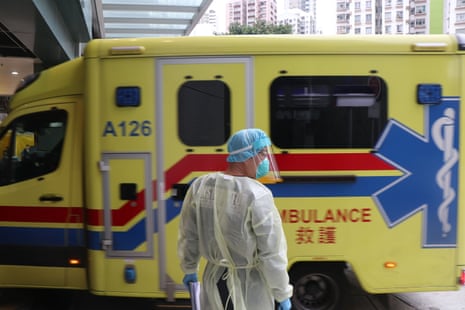
This report is from Reuters.
Protesters opposing pandemic restrictions flouted a court order and emergency rules, continuing to occupy a vital Canada-US trade corridor early on Saturday, hours after a judge granted an injunction to end the blockade that has crippled North America’s well-knitted auto industry.
Prime minister Justin Trudeau has promised Joe Biden quick action to end the crisis, and on Friday a Canadian judge ordered an end to the four-day-long blockade of the Ambassador Bridge, North America’s busiest land border crossing.
The order came into effect at 7pm ET, but five hours after the deadline, some 100 protesters were milling around the entrance to the bridge, waving Canadian flags.
While the number of protesters and police dropped as the night progressed, demonstrators continued to block the bridge with trucks and pick-up vans, preventing any flow of traffic in either direction.
Protesters sang the Canadian national anthem and midnight, and some shouted “Freedom!”
Police, who started to gather in a parking lot a few blocks away from the protesters, began handing out pamphlets that outlined penalties under Ontario’s emergency order, which took effect at midnight.
Trudeau earlier told reporters that no action was off the table.
Companies have diverted cargo to stem losses amid production cuts by companies including Ford.
Superior Court Justice Geoffrey Morawetz on Friday approved the request by auto industry associations and Windsor city authorities hoping to end the protests. Occupying access roads leading to the bridge on Friday, protesters voiced defiance and there was little sign of them backing down.
“Canada is supposed to be a free country,” said Liz Vallee, a protester from Chatham, Ontario. “When that freedom is threatened, we must stand up.” Vallee said she and others would stay until all pandemic mandates are lifted.
The “Freedom Convoy” protests, started by Canadian truckers opposing a vaccinate-or-quarantine mandate for cross-border drivers, are also occupying areas outside government buildings in the national capital Ottawa and have blocked two smaller US crossings.
The protests have inspired similar convoys and plans in France, New Zealand, Australia and the US, whose Department of Homeland Security is working to ensure that a “Freedom Convoy” event due in early March in Washington, DC, “does not disrupt lawful trade.”
East of Ottawa, people were expected to gather in Fredericton in the province of New Brunswick for a weekend demonstration. Local police said officers were stationed at entrances to the city to ensure traffic can continue. Canada’s financial capital Toronto was also bracing for more weekend demonstrations.
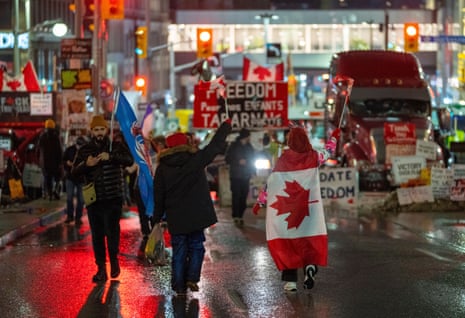
Almost forgot to say – good morning from London! I’m Lucy Campbell, I’ll be bringing you all the latest global developments on the coronavirus pandemic for the next eight hours. Please feel free to get in touch with me as I work if you have a story or tips to share. Your thoughts are always welcome.
Email: lucy.campbell@theguardian.com
Twitter: @lucy_campbell_
Boris Johnson has been sent a questionnaire by Scotland Yard over alleged parties in Downing Street, in a move that could raise fresh concerns among Tory MPs about his leadership, Aubrey Allegretti and Vikram Dodd report.
No 10 confirmed late on Friday night that the prime minister received the document, and vowed he would respond to it “as required”.
About 50 people were asked to account for their presence at the dozen events under scrutiny by the police as part of their inquiry into Covid law breaches, named “Operation Hillman”.
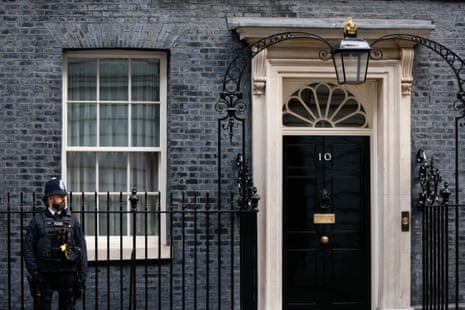
Johnson has continued to insist he broke no rules, but apologised for attending one gathering which was a “bring your own booze” garden party organised by his principal private secretary on 20 May 2020.
He is also believed to have been present at a birthday celebration in No 10 on 19 June 2020 and leaving dos for aides in November that year, and January 2021. Police are also investigating a gathering in his personal flat in Downing Street.
In a clear signal officers are investigating if the prime minister personally broke the law, a No 10 spokesperson said:
We can confirm the prime minister has received a questionnaire from the Metropolitan police. He will respond as required.
The move has the potential to spark fresh concerns among Tory MPs about Johnson’s future, though with parliament in recess, many will spend the next nine days back in their constituencies.
Some backbenchers have held off calling for a ballot on his leadership until the outcome of the Met’s investigation, though suggested that they could submit a letter of no confidence if Johnson is found to have misled parliament or is fined for breaking the Covid rules he set.
The Met declined to confirm the news that the prime minister had received the questionnaire nor whether those receiving them were being treated as potential suspects or witnesses.
The full story is here: PM sent Downing Street lockdown party questionnaire by Met police
Days-long rallies against Covid vaccination mandates picked up in numbers in New Zealand and Australia on Saturday, with protesters blocking roads and disrupting life in the countries’ capitals, Reuters reports.
About 10,000 protesters gathered at Canberra’s major showgrounds, forcing the cancellation of a popular charity book fair, bringing traffic to a standstill and blocking roads in the Australian capital.
Police said three people were arrested, but overall the crowd was “well behaved”.
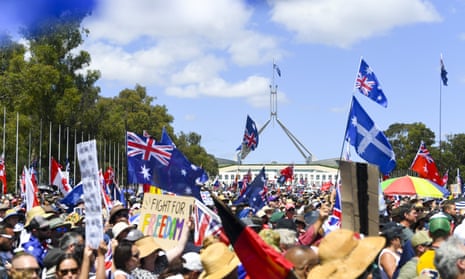
In New Zealand’s Wellington, hundreds of demonstrators gathered near the distinctive “Beehive” parliament for a fifth day despite drenching rain.
Inspired by truckers’ demonstrations in Canada, the protesters have occupied and blocked several streets around parliament with their trucks, vans and motorcycles.
Protests remain relatively small in highly vaccinated New Zealand and Australia, where overwhelming majority of the population supports inoculations. However, the movement has persevered, with rallies occasionally turning violent.
Australia prime minister Scott Morrison said demonstrators had a right to protest, asking them to do it in a peaceful and respectful way.
He noted most vaccination mandates have been imposed by the states and territories, not the federal government.
“So, I understand their concerns about these issues,” Morrison, who has been urging vaccinations, told reporters in Sydney.
The federal government mandated last year vaccinations for aged care workers, disability workers and those that are working in high-risk situations in health system. Most states and territories have imposed broader mandates and barred those not vaccinated from restaurants, concerts and many public venues.
Australian Opposition leader Anthony Albanese, speaking at a media conference in Sydney, said the rallies were not going to gain widespread support. “Go home,” he told the demonstrators.
New Zealand media footage showed one person being stretchered from the rally, carried by paramedics and police. No arrest had been made as of late Saturday, according to the police, who arrested more than 100 people on Thursday.
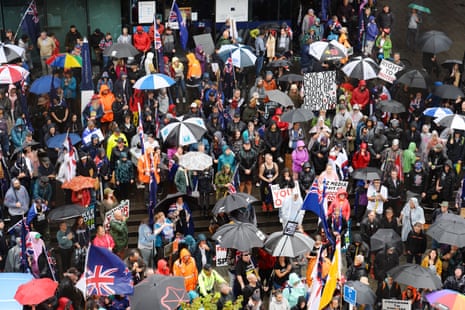
New Zealand logged a daily record of 454 community Covid-19 cases on Saturday.
A country of five million people, New Zealand has reported just under 19,000 confirmed cases and 53 deaths since the pandemic began. About 94% of eligible people are vaccinated, with shots mandatory for some staff in frontline jobs.
In Australia, which is opening its borders to tourists later this month, 94% of those aged 16 and over are double-vaccinated, but the country is still battling a wave of the highly transmissible Omicron variant.
There were at least 65 coronavirus-deaths reported across Australia on Saturday.
THE FIRST E-COMMERCE SPECIALIZED ON TRUFFLES AND TRUFFLE PRODUCTS – TRUFFLEAT.IT

